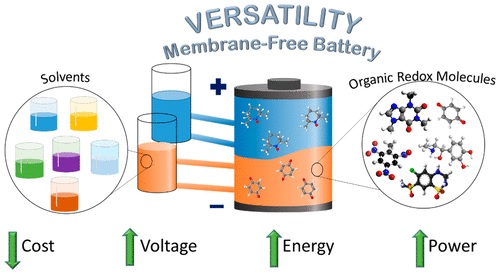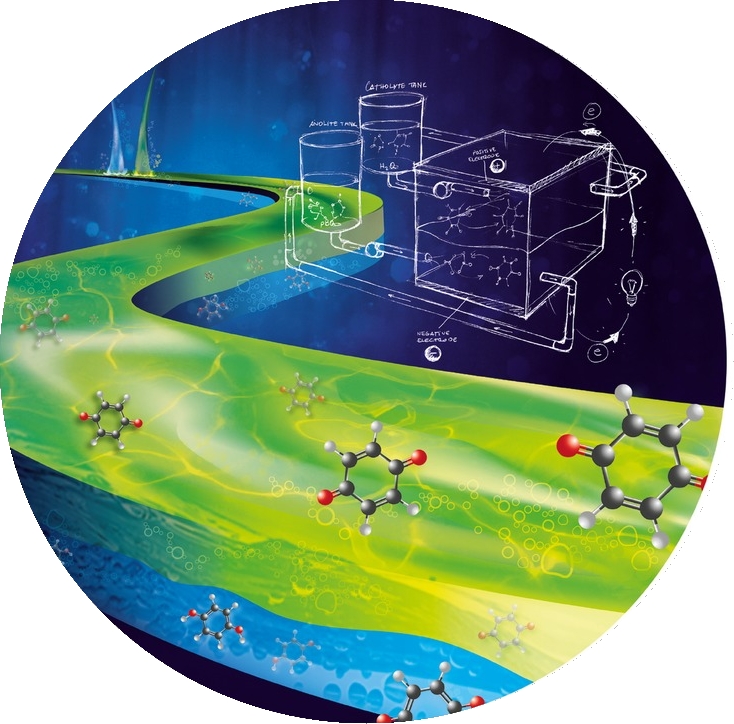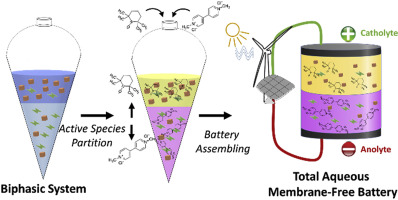Membrane-Free Aqueous Batteries, a Sustainable Energy Storage Solution


Membrane-Free Aqueous Batteries, a Sustainable Energy Storage Solution
Redox Flow Batteries (RFB) stand out as a promising energy storage technology to mitigate the irregular energy generation from renewable sources. Some technical merits stand out the Redox Flow Batteries (RFBs) when compared to conventional batteries such as their scalability and the total decoupling of energy and power. However, one of the most important limitations that obstruct their massive penetration into the market is the high price of some of the current components of RFBs, specifically, the scarce and, in some cases also toxic, metallic compounds that are used as active species (V, Cr, etc) and the poor-performing ion-exchange membranes that are necessary to avoid the electrolytes cross-mixing. Different approaches have been proposed in the last years to overcome these problems. Among them, the substitution of metallic redox species by sustainable, abundant and tunable organic redox molecules is attracting an increasing interest among the scientific community. Regarding the problematic membrane, the mere substitution of ion-selective membranes by inexpensive porous separators is emerging as a new trend in RFBs. In those systems, the huge and unavoidable crossover of active species though the separator is mitigated, in some extent, by using mixed electrolytes. However, this approach causes a large and implicit loss of material utilization because half of the active species is unusable.
Making use of a disruptive approach, Dr. Rebeca Marcilla, senior researcher in IMDEA Energy, is leading a ERC Consolidator Grant project (https://cordis.europa.eu/project/id/726217/es) aiming to eliminate any type of membrane or separator in RFBs. Her research group is developing a novel concept of Membrane-Free Battery based on the immiscibility of two electrolytes and in which the metallic active compounds were substituted by organic redox molecules.
In their last article, in collaboration with the group of Prof. Joao Coutinho (University of Aveiro, Portugal), they report the first example of Total Aqueous Membrane-Free Battery. There, they develop an aqueous biphasic system (ABS) containing organic redox compounds with proper redox potentials and suitable partitioning coefficients. They demonstrate the feasible application of this novel membrane-free concept in an Aqueous Biphasic Systems (ABS) which behaves as an unprecedented Total Aqueous Membrane-Free Battery.
P. Navalpotro, C. Trujillo, I. Montes, C.M.S.S. Neves, J. Palma, M.G. Freire, J.A.P. Coutinho, R. Marcilla* "Critical aspects of Membrane-Free Aqueous Battery based on two immiscible neutral electrolytes" Energy Storage Materials, 2020, 26, 400-407. https://doi.org/10.1016/j.ensm.2019.11.011
Más información: Rebeca Marcilla This email address is being protected from spambots. You need JavaScript enabled to view it., Investigadora Senior de la Unidad de Procesos Electroquímicos. https://www.energia.imdea.org/research_units/

Baterías Acuosas sin membrana, una solución de almacenamiento de energía sostenible
Las baterías de flujo redox (RFB) constituyen una prometedora tecnología de almacenamiento de energía para mitigar la generación intermitente de energía a partir de fuentes renovables. Algunos méritos técnicos con respecto a otras baterías convencionales como las de Li-ión son su escalabilidad y el desacoplamiento total de energía y potencia. Sin embargo, una de las limitaciones más importantes que dificultan su penetración masiva en el mercado es el alto precio de algunos de los componentes actuales como son las especies activas basadas en metales (generalmente escasos y, en algunos casos también tóxicos) así como las membranas selectivas de intercambio iónico. Estas membranas son necesarias para evitar la mezcla cruzada de especies activas de los electrolitos pero son caras y en muchos casos ineficaces. Desde la comunidad científica se han propuesto diferentes estrategias para superar estos problemas. Entre ellas, la sustitución de especies redox metálicas por moléculas redox orgánicas, sostenibles, abundantes y baratas. Con respecto a la problemática membrana, la mera sustitución de membranas selectivas de iones por separadores porosos más económicos está emergiendo como una nueva tendencia en RFB. En estos sistemas, los problemas derivados del inevitable cruzamiento de las especies activas, se mitigan en cierta medida, mediante el uso de electrolitos que contienen las mismas especies en ambos compartimentos. Sin embargo, esto supone un desaprovechamiento del material activo puesto que la mitad de las especies activas empleadas no contribuyen al almacenamiento neto de energía.
Utilizando un enfoque disruptivo, la Dra. Rebeca Marcilla, investigadora principal de IMDEA Energía, lidera un proyecto ERC Consolidator Grant (https://cordis.europa.eu/project/id/726217/es) que tiene como último objetivo eliminar cualquier tipo de membrana o separador en baterías de flujo redox. Su grupo de investigación está desarrollando un nuevo concepto de batería sin membrana basado en la inmiscibilidad de dos electrolitos y en el que los compuestos metálicos activos se sustituyan por moléculas redox orgánicas.
En su último artículo, en colaboración con el grupo del Prof. Joao Coutinho (Universidad de Aveiro, Portugal), publican el primer ejemplo de batería sin membrana que utiliza dos electrolitos acuosos inmiscibles. En este trabajo desarrollan un sistema bifásico acuoso (ABS) que contiene compuestos redox orgánicos con propiedades electroquímicas (potencial redox) y termodinámicas (coeficientes de reparto) optimizadas. Demuestran por primera vez la aplicación factible de este novedoso concepto sin membrana en un sistema bifásico acuoso que se comporta como una batería reversible con excelentes propiedades electroquímicas y de sostenibilidad.
P. Navalpotro, C. Trujillo, I. Montes, C.M.S.S. Neves, J. Palma, M.G. Freire, J.A.P. Coutinho, R. Marcilla* "Critical aspects of Membrane-Free Aqueous Battery based on two immiscible neutral electrolytes" Energy Storage Materials, 2020, 26, 400-407. https://doi.org/10.1016/j.ensm.2019.11.011
More information: Rebeca Marcilla This email address is being protected from spambots. You need JavaScript enabled to view it., Senior Researcher at Electrochemical Processes Unit. https://www.energia.imdea.org/research_units/
Tags: Rebeca Marcilla, Membrane-Free Redox Flow Batteries , Redox Flow Batteries, European Project


